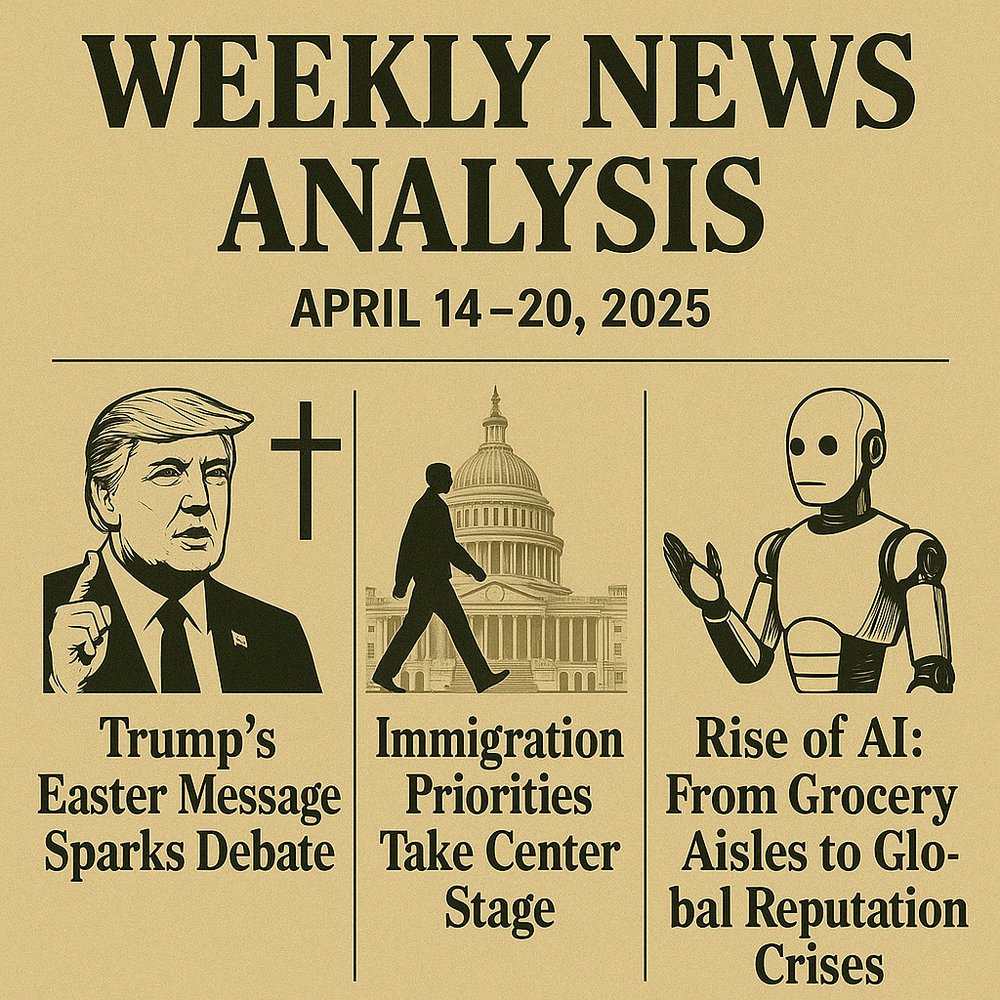
This week, the machinery of politics, immigration, and artificial intelligence ground louder than ever. From the Easter pulpit to the southern border, from public protests to grocery aisles filled with robots, the future of American identity and labor took center stage.
Trump’s Easter Message Sparks Debate
Trump shreds Biden, 'radical left lunatics' in Easter message – Fox News
Trump uses Easter message to attack judges who ruled against his immigration actions – Forbes
President Donald Trump transformed what has traditionally been a day for spiritual reflection into a stage for political confrontation. His Easter message—released via his Save America PAC—did not offer themes of unity, rebirth, or forgiveness. Instead, Trump launched a scathing attack against President Biden, branding him the figurehead of "radical left lunatics," and condemned federal judges who had ruled against his key immigration initiatives earlier this year.
In his statement, Trump decried what he called the "systematic destruction" of the United States by progressive forces, tying issues of border security, crime, and judicial activism directly to the broader ideological struggle he claims threatens American sovereignty and freedom.
Fox News framed the message as a necessary and courageous defense of American values against a government increasingly controlled by judicial and bureaucratic elites. In this framing, Trump's message was positioned as a call to arms—a reminder that America's survival depends on confronting the political establishment without apology, even on sacred holidays.
Forbes, by contrast, highlighted how Trump's Easter remarks represented a deeper cultural shift. Even the most traditionally nonpartisan and sacred moments are now weaponized for political advantage. They noted that Trump’s rhetoric illustrated how partisan warfare no longer pauses for civic traditions or religious observances. Every holiday, every ceremony, every national symbol is becoming another front in America's ongoing political and cultural battles.
Among Trump’s base, the message was praised for its directness, authenticity, and refusal to cede ground to what they view as an increasingly hostile political and media environment. Many supporters see Trump's unrelenting tone not as a departure from tradition but as a necessary adaptation to an era where political enemies never sleep.
Critics warned that this relentless politicization erodes the last remnants of national cohesion. When even shared holidays like Easter become rallying cries for grievance and division, they argue, the very idea of a unified American identity, rooted in shared values beyond politics, grows more fragile by the day.
Immigration and Citizen Priorities Take Center Stage
Democrats prioritized foreign criminals while ignoring American citizens - Gateway Hispanic
Trump falsely claims Democrats prioritize foreign criminals over American citizens - CNN
Immigration continued to ignite a national firestorm this week, with former President Donald Trump placing the issue at the heart of his political offensive. During a series of rallies and public appearances, Trump accused Democratic leaders of prioritizing the welfare of illegal immigrants, including individuals with known criminal histories, over the safety, rights, and prosperity of American citizens. Of course, Trump ignored those swept up in the push who had no ties to gangs or criminal history.
The urgency of the immigration debate was palpable, as Trump framed the current immigration system not as a humanitarian project, but as a politically motivated restructuring of the American demographic and economic order. In fiery speeches, Trump argued that the Biden administration and its allies had effectively abandoned the concept of national loyalty, redirecting public resources, legal protections, and welfare programs toward non-citizens at the direct expense of those born or naturalized in the United States.
Gateway Hispanic amplified this message with viral video clips capturing emotional moments from Trump's rallies, where he linked surges in violent crime, collapsing urban infrastructure, and drug-related deaths directly to unchecked illegal immigration. The emotional impact of Trump's rhetoric on his base was evident, as he portrayed the crisis not merely as a border problem, but as a national security and cultural survival issue, arguing that American communities, particularly working-class and minority neighborhoods, were paying the highest price.
CNN, meanwhile, pushed back sharply against Trump's claims. In its live political coverage, the network described his accusations as false, inflammatory, and designed to exploit fear. CNN commentators warned that Trump's rhetoric risked painting immigrants as scapegoats for broader systemic failures, stoking racial tensions, and undermining efforts to reform and humanize U.S. immigration policy.
Despite the polarized framing, the political reality is undeniable: immigration has re-emerged as one of the most potent and divisive forces shaping the 2026 electoral battlefield, as it does for every election season. Lines are hardening around the core issues of citizenship, sovereignty, security, and national identity—issues that tap into deep emotional undercurrents about belonging, trust, and the future direction of the republic itself.
Rise of AI: From Grocery Aisles to Global Reputation Crises
AI-powered robot army packs your groceries in minutes - Fox News
Trump and Musk brand reputations plunge in global AI survey - The Guardian
While politics dominated the major headlines, a quieter but equally transformative revolution continued to advance beneath the surface—the relentless rise of AI and automation. According to Fox News, AI-driven "robot armies" have now become operational in American supermarkets, rapidly packing groceries with a speed and precision that human workers cannot match. These automated systems, powered by sophisticated machine learning algorithms and robotic engineering, promise to dramatically reduce labor costs and mitigate ongoing staffing shortages that have plagued retail sectors since the COVID-era disruptions.
Supporters of the initiative heralded it as a breakthrough moment. They praised the efficiency gains, the stabilization of supply chains, and the potential to allow human workers to move into "higher-value" roles. Automation's promises were framed as an essential evolution in an economy still grappling with inflation and uneven employment recovery. This is on schedule for the Agenda 2030 goals.
Yet critics sounded a very different alarm. Labor advocates, economists, and community leaders warned that these machines represent not just technological progress, but a seismic shift that could displace millions of low-wage workers across retail, food service, warehousing, and logistics industries. The potential societal consequences of automation were stressed, as they cautioned that the nation is ill-prepared for the socio-economic implications of mass displacement, consequences that include rising inequality, community destabilization, and the erosion of pathways out of poverty for working-class families.
Universal Basic Income will be the solution for this purposefully created problem.
Simultaneously, The Guardian's global brand reputation survey revealed a deepening crisis of public trust in figures heavily associated with the AI revolution, including Donald Trump and Elon Musk. Once celebrated as visionaries steering humanity into the future, both men have seen their reputations plummet due to rising fears about the unchecked consequences of artificial intelligence. Survey respondents cited various concerns: fears over job destruction, ethical abuses by AI systems, surveillance capitalism, and a growing sense that political and technological elites are reshaping the world without public consent or accountability.
The twin realities emerging—rising automation and collapsing institutional trust—paint a troubling picture of the future. Technological advancement continues at a breakneck pace, but societal, political, and psychological readiness to manage this transformation lags dangerously behind.
A Machine Without Pause
This week revealed a sobering reality: every major force shaping America—political, cultural, and technological—is accelerating, and none is slowing down to ask permission.
Trump’s Easter message demonstrated that even sacred holidays are now weaponized as battlegrounds for political dominance, stripping national traditions of any neutral ground. The immigration debate resurfaced with renewed ferocity, redrawing battle lines over policy and the fundamental meaning of citizenship and loyalty. And beneath it all, the relentless advance of automation continued reshaping everyday life—quietly displacing workers and eroding public trust in leaders long hailed as architects of the future.
Each sphere—faith, citizenship, labor—is under siege not by accident, but by design.
The machine of modern power grinds forward: politicizing unity, destabilizing belonging, and accelerating progress without preparing society for its consequences. This week was not an outlier. It was a signal that the systems once meant to serve humanity—politics, technology, governance—are becoming systems that consume it.
And the question facing every American grows more urgent: Will you shape the machine—or will it shape you?
Listen to this week's news in verse for a quick recap!


